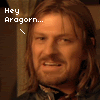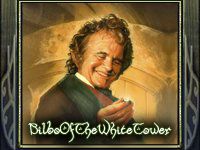hithero wrote:
Hellfury wrote:
hithero wrote:
...since when was Middle-earth inhabited by all these battle-winning spell casters!
Since the Valar sent 5 maiar emissaries of valinor to middle earth.
I seem to recall pther epic personages as well. Gems of great power made by faenor that caused a huge ruckus. Spiderdemons who could devour everything, including herself. Armies of balrogs where a certain defiant elf was able to slay many singlehandedly.
etc. etc. etc.
Middle earth is an epic. WotR relates to this proportion.
But they are not in the rules and the rules don't go back to that era so is irrelevent.
That's not completely fair to say they're not applicable.
I don't have my books with me here at work, but in the appendix describing the final victory of Lothlorien over Dol Guldur it sounds like Galadriel threw down a host of foes almost single-handidly, and then tore open the evil fortress itself (paraphrasing here obviously). Elrond is forever described as a great force himself who, if ever pressed to battle, I would wager would be as Epic as anything WotR presents and Glorfindel is talked up as a great Elf lord. The Nazgul were beings of such power that all Minas Tirith would tremble on their passage even though they were facing an entire army of Mordor at their doorsteps. And the Wizards, though rarely casting open magic, were considered among the greatest powers in Middle Earth. I doubt Gandalf got his reputation just from his fireworks.
Though we may (often and rightly so!) question some of GW's design decisions, and I can easily believe that some of those decisions regarding WotR were tainted by some of their other game systems, I think it's a mistake to say that just because Tolkien didn't describe it directly in the scope of the four main books that it didn't happen. JRRT has a lot of "epic" and magical scenes take place off the main page in the form of retelling, hints, allusions or apendicies notes.
Yes, some of the magic in WotR is more "in your face" than we have read in the books but most of it, even the powerful spells, are still within the flavor of the stories. Many deal with supporting or disrupting Formations of troops in indirect ways, not blasting away with Fire Balls or Lightning Bolts all willy nilly.
I think the main place WotR falls down in this respect to allowing too many spell casters in many cases, but again it's not all too bad if not taken purely at face value but rather what it brings to the game. For example, the Elvish Stormcaller: Elf bows in WotR lack some punch over other races with Long Bows, but the presence of a Stormcaller (at the expense of two potential Companies) gives access to a little magic that can help enforce their shooting power or else a spell that can enforce the overal combat effectiveness of an Elvish formation. Magic in Middle Earth was always more restricted than most lower fantasy worlds and so for a pure interpretation of the rules vs. Middle Earth the likelihood of so many nameless, low-level spell castsers is counter-Tolkien. But keeping them more in the mind as a tool for enhancing a Formation may soften the blow a bit.
Except for the introduction of too many "nameless" spell casters, I think the problem may come as much from how players setup their lists, looking for killer combos and loop holes, than from the design itself. If someone builds a list that's packed with magic then they care little for Tolkien's themes themselves. Just because you CAN pull in four or five spell casters doesn't mean you need to. Just as in SBG people abused the Grey Company, Spider Queens and others that I'm just not thinking of right now, in WotR you can abuse lists if you want. But no one is forcing you to. A player makes the decision on their own to do so. If you can reasonably justify from some of Tolkien's own work that something did or may have happened then that's one thing but to together a power list just because you can and then have no basis for it even being close to possible is just not something any real fan would enjoy playing against very much.
Finally, WotR is in its first evolution. Look at the difference between SBG with the OR book and SBG from the Fellowship and even RotK books. When WotR 2.0 rolls out we can hope it will be a more smooth and playable system, but for now I think it can do what it's trying to do.
Well, that went on longer than I expected. Hope it's still partly coherent. In a nutshell for me: SBG is better system for playing out most of what you may love from Tolkien's work, and I really like the individual-model scale and feel. But WotR is a decent system for large Formation-based play as long as the players are all Middle Earth fans and try to build lists and play them in a way that is consistent with the world rather than looking for every option in the under-developed rule set.
 Top
Top Top
Top Top
Top Top
Top Top
Top Top
Top Top
Top Top
Top Top
Top Top
Top Top
Top Top
Top Top
Top Top
Top Top
Top Top
Top Top
Top Top
Top Top
Top Top
Top
 WoTR just doesn't feel like Middle-earth and with all the arguments seen on the forums over its rules, I doubt if I will ever play in a competition as no two people play the game the same way.
WoTR just doesn't feel like Middle-earth and with all the arguments seen on the forums over its rules, I doubt if I will ever play in a competition as no two people play the game the same way.













